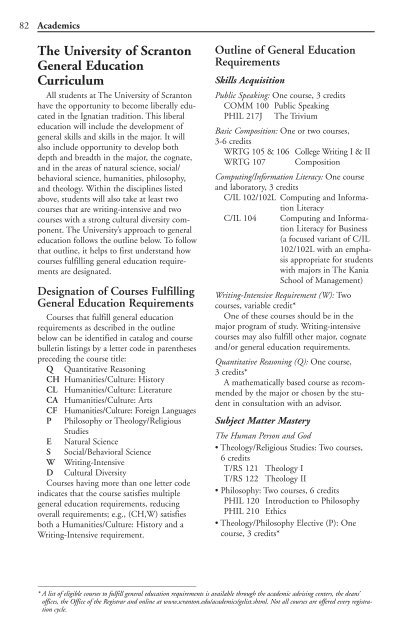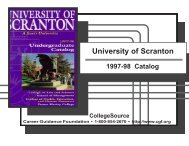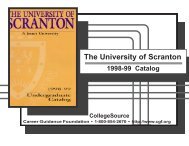2003-2004 - The University of Scranton
2003-2004 - The University of Scranton
2003-2004 - The University of Scranton
You also want an ePaper? Increase the reach of your titles
YUMPU automatically turns print PDFs into web optimized ePapers that Google loves.
82 Academics<br />
<strong>The</strong> <strong>University</strong> <strong>of</strong> <strong>Scranton</strong><br />
General Education<br />
Curriculum<br />
All students at <strong>The</strong> <strong>University</strong> <strong>of</strong> <strong>Scranton</strong><br />
have the opportunity to become liberally educated<br />
in the Ignatian tradition. This liberal<br />
education will include the development <strong>of</strong><br />
general skills and skills in the major. It will<br />
also include opportunity to develop both<br />
depth and breadth in the major, the cognate,<br />
and in the areas <strong>of</strong> natural science, social/<br />
behavioral science, humanities, philosophy,<br />
and theology. Within the disciplines listed<br />
above, students will also take at least two<br />
courses that are writing-intensive and two<br />
courses with a strong cultural diversity component.<br />
<strong>The</strong> <strong>University</strong>’s approach to general<br />
education follows the outline below. To follow<br />
that outline, it helps to first understand how<br />
courses fulfilling general education requirements<br />
are designated.<br />
Designation <strong>of</strong> Courses Fulfilling<br />
General Education Requirements<br />
Courses that fulfill general education<br />
requirements as described in the outline<br />
below can be identified in catalog and course<br />
bulletin listings by a letter code in parentheses<br />
preceding the course title:<br />
Q Quantitative Reasoning<br />
CH Humanities/Culture: History<br />
CL Humanities/Culture: Literature<br />
CA Humanities/Culture: Arts<br />
CF Humanities/Culture: Foreign Languages<br />
P Philosophy or <strong>The</strong>ology/Religious<br />
Studies<br />
E Natural Science<br />
S Social/Behavioral Science<br />
W Writing-Intensive<br />
D Cultural Diversity<br />
Courses having more than one letter code<br />
indicates that the course satisfies multiple<br />
general education requirements, reducing<br />
overall requirements; e.g., (CH,W) satisfies<br />
both a Humanities/Culture: History and a<br />
Writing-Intensive requirement.<br />
Outline <strong>of</strong> General Education<br />
Requirements<br />
Skills Acquisition<br />
Public Speaking: One course, 3 credits<br />
COMM 100 Public Speaking<br />
PHIL 217J <strong>The</strong> Trivium<br />
Basic Composition: One or two courses,<br />
3-6 credits<br />
WRTG 105 & 106 College Writing I & II<br />
WRTG 107 Composition<br />
Computing/Information Literacy: One course<br />
and laboratory, 3 credits<br />
C/IL 102/102L Computing and Information<br />
Literacy<br />
C/IL 104 Computing and Information<br />
Literacy for Business<br />
(a focused variant <strong>of</strong> C/IL<br />
102/102L with an emphasis<br />
appropriate for students<br />
with majors in <strong>The</strong> Kania<br />
School <strong>of</strong> Management)<br />
Writing-Intensive Requirement (W): Two<br />
courses, variable credit*<br />
One <strong>of</strong> these courses should be in the<br />
major program <strong>of</strong> study. Writing-intensive<br />
courses may also fulfill other major, cognate<br />
and/or general education requirements.<br />
Quantitative Reasoning (Q): One course,<br />
3 credits*<br />
A mathematically based course as recommended<br />
by the major or chosen by the student<br />
in consultation with an advisor.<br />
Subject Matter Mastery<br />
<strong>The</strong> Human Person and God<br />
• <strong>The</strong>ology/Religious Studies: Two courses,<br />
6 credits<br />
T/RS 121 <strong>The</strong>ology I<br />
T/RS 122 <strong>The</strong>ology II<br />
• Philosophy: Two courses, 6 credits<br />
PHIL 120 Introduction to Philosophy<br />
PHIL 210 Ethics<br />
• <strong>The</strong>ology/Philosophy Elective (P): One<br />
course, 3 credits*<br />
* A list <strong>of</strong> eligible courses to fulfill general education requirements is available through the academic advising centers, the deans’<br />
<strong>of</strong>fices, the Office <strong>of</strong> the Registrar and online at www.scranton.edu/academics/gelist.shtml. Not all courses are <strong>of</strong>fered every registration<br />
cycle.
















